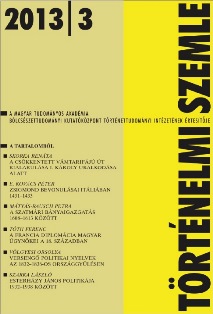„…méltóztassék kinevezni különleges ügynöknek”. A francia diplomácia magyar ágensei a hosszú 18. században
Please it to Your Majesty to Appoint Him as a Special Agent”. The Hungarian Agents of French Diplomacy in the Long 18th Century
Author(s): Ferenc TóthSubject(s): History
Published by: Magyar Tudományos Akadémia Bölcsészettudományi Kutatóközpont Történettudományi Intézet
Summary/Abstract: The aim of the present study is to illuminate a less known episode in the history of Hungarian emigration from the end of 17th century until the age of Napoleon, namely the activity in Eastern Europe of Hungarian agents in French service. Research is considerably hindered by the fact that the relevant sources are widely dispersed in the collections of different archives, chiefly in the central collections of the French Diplomatic Archives, and in its branch at Nantes, in the ambassadorial archives of Constantinople, but also in the French central archives of military history and in various state and private collections. French diplomacy became aware of the importance of Hungarian agents already in the time of the Rákóczi revolt. After the suppression of the uprising, several Hungarian agents were given an important role in the service of the French ambassadors in Constantinople. During the wars in the first half of the 18th century Hungarian agents, hussar officers of the army of Rákóczi who had gone over to French service after the deafeat, were employed on several occasions in secret missions. In the years before the Austro-Turkish war of 1737–1739, the war of the Austrian succession and the great „diplomatic revolution“ (1756), intensive activity by Hungarian agents was characteristic in the Ottoman Empire, before all among the ranks of the Rodostó (Tekirdag, Turkey) emigrees. The Austro-Ottoman alliance of 1756 brought about a sharp ceasure, as it made the anti-Habsburg operation of Hungarian agents impossible. In accordance with the changes of French policy towards Eastern Europe, the son of agent András Tóth, the diplomat François de Tott, who had previously been trained to become the professional successor of his father, was eventually empolyed first in the Crimea, and then in the Near East. In the course of the revolutionary and Napoleonic wars, the importance of the Hungarian movements of independence once again came to the fore. A valuable example is the career of János Károly Besse, which could be reconstructed on the basis of his personal documentation preserved in the French Diplomatic Archives. It was a general characteristic of the period that French diplomacy took a very cautious attitude with regard to the Hungarian problem, and only resorted to the help of secret agents in war situations. While many among the Hungarian emigrees in France worked enthusiastically in the service of the state secretary of foreign affairs, only a handful among them achieved higher status and employment there. Nevertheless, their diplomatic achievement brought about considerable results in the development of Ottoman-French relations and in strengthening French diplomatic presence in Eastern Europe.
Journal: Történelmi Szemle
- Issue Year: 2013
- Issue No: 03
- Page Range: 381-399
- Page Count: 19
- Language: Hungarian

